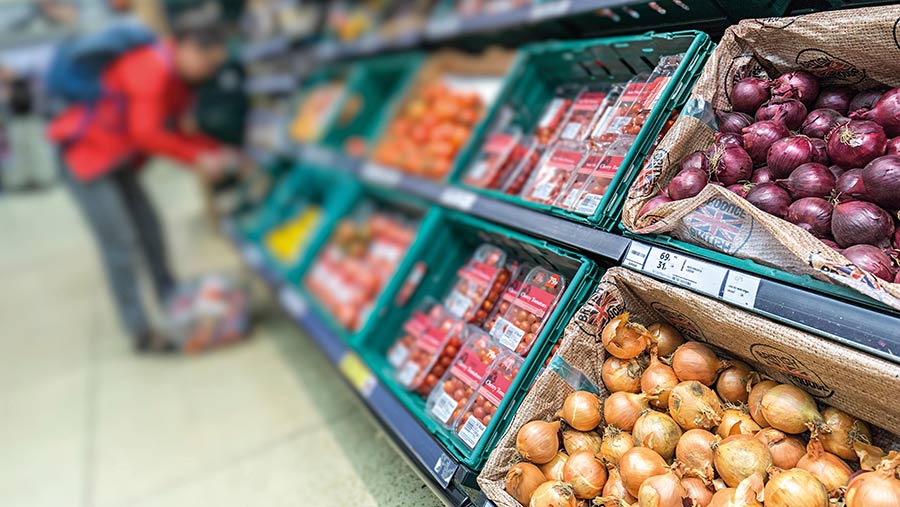Minette Batters warns of market failure without government action
 Chris Howes/Wild Places Photography/Alamy Stock Photo
Chris Howes/Wild Places Photography/Alamy Stock Photo The government must use its powers under the Agriculture Act to avert a market failure in protected crops and other sectors, said NFU president Minette Batters.
Unless action is taken, continued contraction in production will drive further food inflation, she warned.
Her call comes as work by retail analyst Kantar shows a big move by consumers to buying value lines (see “Consumers turn rapidly to cheaper products”).
See also: Grocery inflation hits 12% as shoppers turn to value lines
“There is a building situation on the back of the Covid-19 pandemic that makes Covid look straightforward,” said Mrs Batters.
“Every sector is affected, but especially pigs, poultry, dairy and horticulture – it’s very scary.
“There is an affordability challenge – what can the market afford, and what can producers afford to produce at. We have lived with a retail price war for years, but now there is a tightening of supply,” she says.
“We are seeing a massive contraction in the protected crops sector. I have had calls from growers who say that unless the government intervenes with direct aid for this sector, it is just not viable.”
Defra figures show a 6% drop year-on-year in cucumber production and a similar situation in tomatoes.
There has been a 5% reduction in broiler chick placings, with this sector suffering from the combined effect of Covid-19, avian flu and rising input costs.
Egg production in April to June this year was 11% lower than in the same period of 2021.
Since the start of 2022, there has been a monthly rise in liquid and dried egg imports for food processing of up to 45% compared with 2021 levels, further undermining domestic production.
The out-of-home food market looks ever more challenging, said Mrs Batters, while energy costs in milk production could jump from their typical 1p/litre level to 6-8p/litre.
Fresh produce crisis
At the British Growers Association, which represents processed and fresh vegetable and fruit producers, chief executive Jack Ward said:
“It’s a seriously scary moment for the fresh produce industry, at a time when we should be looking at expanding and making supply more resilient.
“The hardest hit today are those with high energy bills – any crops that are stored, such as onions, apples and some brassicas.
“Retailers are moving to either premium lines at lower volume or value lines at lower cost. This is hollowing out some of the returns that a grower could get for standard lines,” he said.
“Grower confidence is being damaged week by week, as are their cash reserves.
“Those cash reserves should be there for investment – we need innovation and creativity, which is critically important for diet and wellbeing.
“The level of investment required for vegetable crops means you have to have a high-cash crop, and you can’t switch that off because you have to service the debt.
“What we need is support from the retailers. We’re looking for models where everyone [in the chain] can get the income they need to remain viable.”
Meat demand flat
British Meat Processors Association chief executive Nick Allen said consumers were down-trading, with interest in mince and burger-type products growing.
This is leading to a carcass balance issue, with prime cuts far less in demand.
Lamb is a hard sell, he said, although a strong export market and the Muslim market were keeping things going.
“Beef is flat and where people used to buy an extra pack for the freezer, they are not doing that now.”
He was highly critical of the lack of detail on the government’s energy support package for business.
Consumers turn rapidly to cheaper products
- Grocery price inflation hit 12.4% in August – a new record, according to retail analyst Kantar
- Average annual grocery bill of £5,181 is £571 more expensive than a year ago
- Sales of cheapest own-label products rose by one-third compared with a year ago
- Own-label value products accounted for more than half of sales, and retailers are expanding these ranges
